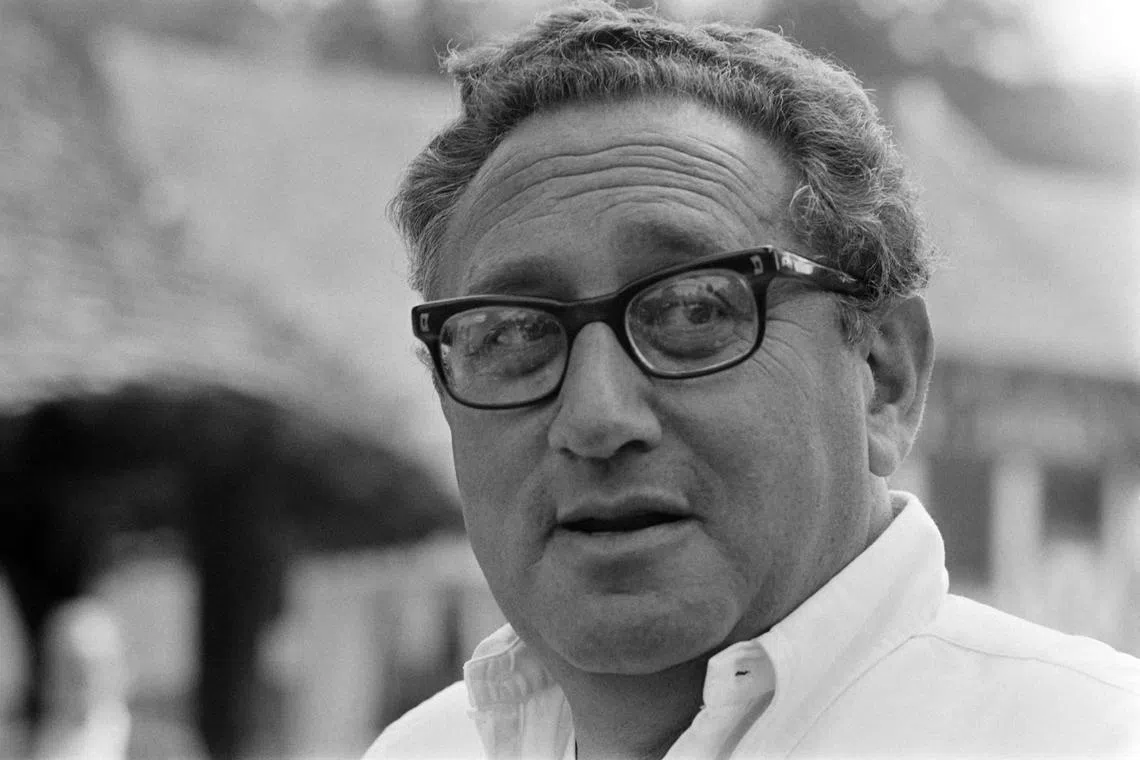At 100, Kissinger basks in US praise with no accountability
Sign up now: Get ST's newsletters delivered to your inbox

Former US Secretary of State Henry Kissinger, in a photo taken in 1976, wielded influence like few before or after him.
PHOTO: AFP
Follow topic:
WASHINGTON - Dr Henry Kissinger, whose very name is synonymous with US diplomacy, turns 100 on Saturday, feted by the American elite as others seethe that the ruthless Cold Warrior has never faced accountability.
From opening the door to communist China to plotting an endgame to the Vietnam War and unapologetically backing dictators who were anti-Soviet, he wielded influence like few before or after him,
Instantly recognisable for his bookishly thick glasses and a sharp-witted monotone that never lost a touch of his native German, he was first an academic and his intellectual gifts are acknowledged begrudgingly even by some of his harshest critics.
Since leaving office in 1977, his brand of realpolitik – the coldly cynical championing of power and national interests – has largely fallen out of favour as his successors preached moralism, but Dr Kissinger himself has if anything enjoyed greater repute.
Ahead of his centennial, he blew candles on a cake at a celebratory luncheon at the Economic Club of New York, the city where he grew up after his Jewish family fled Nazi Germany.
Showing his worldview has not changed at the century mark, he cautioned for the United States to stay within the bounds of “vital interests”.
He told the guests: “We need to be always strong enough to resist any pressures.”
Bucking the view of most US policymakers, he called for diplomacy with Russia on a ceasefire in Ukraine, arguing that Moscow has already suffered a strategic defeat.
‘He has gotten away with it’
An unlikely playboy in Washington in the 1970s, Dr Kissinger now lives in a tiny apartment on New York’s Park Avenue.
He has grown wealthy consulting businesses through his relationships in China – and has warned Washington against treating Beijing as a new Cold War-style adversary.
Long despised by the left, he has come into the good graces of the mainstream of the Democratic Party.
Mrs Hillary Clinton, after serving as secretary of state, called him “a friend” and said she “relied on his counsel”. The incumbent, Mr Antony Blinken, teased Dr Kissinger about his stylishness when he attended a State Department luncheon last year.
But for many, Dr Kissinger was seen as an unindicted war criminal for his role in, among other events, expanding the Vietnam War to Cambodia and Laos, supporting military coups in Chile and Argentina, greenlighting Indonesia’s bloody invasion of then East Timor in 1975 and turning a blind eye to Pakistan’s mass atrocities during Bangladesh’s 1971 war of independence.
“To me, there’s no doubt that his policies have caused hundreds of thousands of deaths and have destroyed democracy in many countries,” said Mr Reed Kalman Brody, a veteran human rights lawyer whose cases have included working with victims of Chilean dictator Augusto Pinochet.
“I’m bewildered that he has gotten away with it,” he said.
Dr Kissinger has never faced serious legal jeopardy, with a US judge in 2004 throwing out a lawsuit related to the assassination of Chile’s army chief and the US boycotting the International Criminal Court.
But Mr Brody said there would be a strong legal case on Timor-Leste, where Dr Kissinger not only approved the invasion but ensured US weapons kept flowing to Indonesia’s military.
He also pointed to a recording, released over Dr Kissinger’s objections, in which Dr Kissinger tells Mr Nixon that the air force had orders in Cambodia to hit “anything that moves”. Indiscriminate bombing of civilians is a war crime.
The late writer Christopher Hitchens published a book calling for Dr Kissinger to be tried on grounds including tacitly backing Turkey’s 1974 invasion of Cyprus.
Belief in larger goals
For Dr Kissinger, most important was always the larger goal. On Cyprus, he prioritised solid relations with Turkey. On Bangladesh, he wanted to preserve Pakistan as a secret channel between the US and China.
Dr Kissinger “actively supported genocide in Bangladesh”, said Dr Muntassir Mamoon, a prominent history professor at the University of Dhaka. “I don’t find any reason to praise Kissinger,” he said, adding that the view was shared in many other countries, including Vietnam.
Dr Kissinger was controversially co-awarded the Nobel Peace Prize for negotiating a ceasefire in Vietnam alongside Hanoi’s Le Duc Tho, who refused to accept the award.
“The irony is that he gets remembered for making peace, but all the ways he contributed to an escalation of the war not only in Vietnam, but in Cambodia and Laos, get lost,” said Professor Carolyn Eisenberg, a historian at Hofstra University who wrote a book on Dr Kissinger.
Prof Eisenberg also played down Dr Kissinger’s public image as “some Machiavelian genius”, saying that transcripts showed how China’s premier Zhou Enlai played him through flattery.
“Zhou Enlai knows that this guy has a huge ego problem,” she said.
Mr Brody, despite his criticism of Dr Kissinger, acknowledged that he had a “degree of gravitas and sophistication” that both overshadowed most US policymakers and endeared many to him.
“Perhaps the reward of being on the side of the powerful is that you’re only resented and hated by the weak.” AFP

